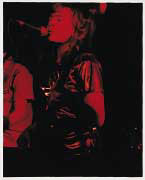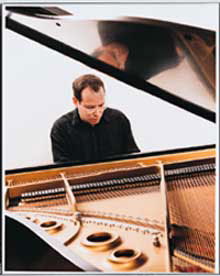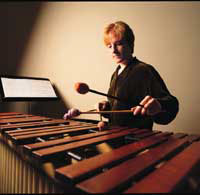Three Young Composers, Key of Vassar

Walsh works as a scriptwriter and production manager for ABC Radio Today in New York, but spends the rest of her time writing for and performing in several rock bands, including Curtis Eller's American Circus. A successful collaboration with composer and percussionist Adam Budofsky resulted in the formation of their band Una Pong, which cut its first CD, Dissolve, last year. A selection from this disk, "How Can You Like That Movie?", was performed at the Vassar Reunion Composer's Concert last June. A mix of mellow recorded musical phrasings and onstage live spoken elements, it gives an acoustic picture of how two people can communicate without really reaching each other.
Walsh likes to use the term "soundsculpture" to describe much of her work; she shapes sounds using synthesized and acoustic elements, instrumentation, and spoken words; in performance, she includes visual components as well.
At Vassar, Walsh studied piano with Todd Crow and taught herself to play bass. She worked with both Richard Wilson and Annea Lockwood in composition. After studying at Kings College in London, she is now working toward a master's in theory and composition at Montclair State University in New Jersey.

By treating unusual items as instruments with which to make music, Walsh has a nearly endless palette of colors and sonic textures to draw from. "My new favorite toy is a 35-year-old portable tape recorder. It came with its own microphone and has a highly variable, and totally uncontrollable, playback speed-which adds up to hours of compositional fun!"
Wholly different approaches to composition open up for Walsh when she is not bound by the dictates of live performance, in both musical and practical aspects. "When you work with machines you can combine the composing and performing processes," she observes. "You can hear what you're working on right away, instead of a) finding people to play the piece, b) paying them, c) finding a place to rehearse and d) paying for that-not to mention responding to comments like 'Where's the melody?' and 'But I don't like to play in 11/8 [time].' "
Musing on what draws her to compose, Walsh notes, "Composing isn't how I make my money, but it is what I do for a living. It's an integral part of my life."
A second CD is forthcoming, and more information on Una Pong and upcoming performances can be found at http://pages.hotbot.com/arts/una-pong/.

Elliott's compositional voice is eclectic. "I was more rigidly non-tonal when I was younger," he reflects, meaning he turned away from music based on a particular key, the harmonic system that governed music from Bach forward until the early 20th century. "In my college and graduate school years, I avoided tonality at all costs. I didn't want to re-write the music of the past. I wanted to create something totally and uniquely my own, and to me, tonality was too full of reference to be usable."
Since then, though, the demands of the music market and the realities of writing for both professional and nonprofessional groups have led him to greater versatility, from creating ultra avant-garde compositions to arranging traditional tunes. He frequently uses electronic sounds in his scores.
Two short pieces the composer performed on the piano, accompanied by additional music on a recording, at the Vassar Reunion Composer's Concert last year were indicative of his new eclecticism. The works, entitled "Bugs" and "Ganges," are elements of what Elliott describes as "a large-scale work of extreme duration, made up of short individual movements." That large-scale work is grandly called A History of Sensation, and Elliott calls it a lifetime project. "I don't imagine I'll ever finish it. As I keep adding to it, it will keep growing. It will only be finished when I am finished."

Elliott was born in Philadelphia and began studying piano at age six. At Vassar he continued with music-studying piano with Todd Crow and composition with Annea Lockwood. He says his Vassar instructors were invaluable to his development. "They were very committed to performances of student music," he says. After graduation, he received the Chittenden Prize from Vassar, which enabled him to spend the summer at the Aspen Music School. It was there he had the opportunity to work with two giants of 20th-century composition: Jacob Druckman and Witold Lutoslawski. Vassar also supported Elliott's _efforts with a Rose Fellowship the next year. Multiple fellowships from the Yaddo and MacDowell artist colonies were crucial to his career.
Elliott went on to earn his master's and doctoral degrees from the University of Chicago, where he worked with two other towering figures in the contemporary music scene: Ralph Shapey and Shulamit Ran. But his influences go well beyond those he accrued in class; he mentions jazz and the array of styles he used when gigging in high school, from Motown and funk to covers of Rolling Stones songs.
With such a rich blend of music feeding his creative juices, it's no wonder that Elliott's works are in demand from a wide range of artists and organizations. Commissions have come in from the American Composer's Forum, CUBE New Music Ensemble, the Trio Auréole, the North American Saxophone Congress, the Poetry Project and P.S. 122 in New York City, the Riverdale Choral Society, and numerous individual performers. And last year's reunion concert elicited another commission: Alexandra Gardner '90 heard his performance and asked him to compose a piece for a concert she curated at the Levine School of Music.
Now composer-in-residence for St. Ann's School in Brooklyn Heights, Elliott is working on a quartet for piano, horn, bass clarinet, and cello for the faculty chamber music series there. Also coming up is a score for Given Fish, a short film by Melissa James Gibson and Tim Vasen. Elliott has just received a commission for a new work-which he's calling Odd Preludes for alto saxophone and piano-from the International Saxophone Congress. Underwritten by the University of Florida, Odd Preludes will premiere in Montreal this July and be followed by a monthlong residency at the university, where the composer will give concerts, seminars, and lectures on his work.
Elliott's commission from the renowned Metropolitan Opera soprano Heidi Grant Murphy, entitled "Hommage a B.B.," was released last August on the Koch International Classics label, on an album called Dreamscape. The album received widespread critical acclaim, including praise from New York Times new-music specialist Paul Griffiths. Murphy and the Trio Aureole also broadcast Elliott's adaptation of the classic "The Holly and the Ivy" on NPR's "Performance Today" at Christmastime last year.

"Composing is the thing I really like to do best," she says. "I get cranky if I'm not making music." These days, her mood must be soaring; her music has been performed in locations as diverse as the Aspen Music Festival, the Smithsonian Institution, the Atlantic Center for the Arts, the Corcoran Gallery, and the Mid-Hudson Art and Science Center.
Gardner studied percussion (marimba, in particular) and composition at Vassar with Annea Lockwood and Richard Wilson. She took a year off for an internship at Harvestworks, an arts organization that houses a recording studio in New York City. Following graduation, Gardner studied at the California Institute of the Arts; while in California, she studied Afro-Cuban percussion, performing in a West African drumming ensemble and with a salsa band. She went on to earn her master's in music from the prestigious Peabody Conservatory of Music at Johns Hopkins University.
"Vassar gave me an open mind and a willingness to experiment," Gardner says. About her compositional voice, she adds, "I've always been involved in exploring new things and in listening to as much as possible." That broad-reaching interest bears out in her music, which includes electronic music; mixed-media incorporating dance, visual art, and theater; and instrumental works, like "Haunted Leaves," a poignant and beautiful flute solo performed at the 1999 Vassar Reunion Composer's Concert by another Vassar musician, Art Clay '89.
Among Gardner's influences are Pauline Oliveros, Steve Reich, and Gyorgy Ligeti.

"Musically," Gardner says, "I am interested in texture and physical gesture in sound, and in the life of a sound-the way it moves and changes through time, and how it interacts with other sounds." Currently, she teaches music technology at the Levine School of Music in Washington, DC; she recently finished a stint as composer-in-residence for the Liz Lerman Dance Exchange, a nationally renowned contemporary dance company. She created a work for their large millennium project, which incorporated live and recorded music into a dance developed through a collaboration between company members and a group of high-school students.
Gardner's latest commission is a piece for accordion and chamber orchestra for the Southeast Alaska Contemporary Music Festival; it is set to premiere in Juneau in early September. A new piece entitled "Spotted Jasper," for bass clarinet, marimba, and electronics, was written for and premiered by Baltimore's Ensemble NEXT on April 6. "Shifting Sand," for digital tape, was performed in late March at the Brooklyn Arts Exchange. In addition, a self-produced CD entitled Marblehead: Electronic Music 1990-2000 is now available.
Gardner has received awards from numerous institutions, including Meet the Composer, the Mid-America Arts Alliance, ASCAP, the American Composer's Forum, the MacDowell Colony, and the Peabody Conservatory.
David Ezer works as an artist managers in New York City.
